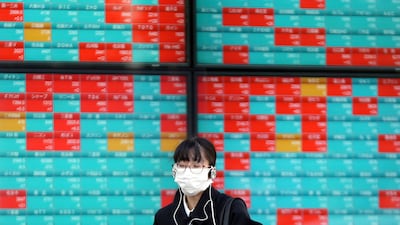Investors dumped risk assets and flocked to havens on Friday as a new variant of coronavirus made its presence known in global markets.
Fears the variant first discovered in South Africa may spread internationally – thwarting the global economic recovery – pushed Treasuries and the yen higher, while the rand fell to its lowest in a year. Asian stocks and US equity futures dropped amid the risk-off tone and crude oil retreated.
While researchers are yet to determine whether the B.1.1529 variant is more transmissible or lethal than previous ones, authorities around the world have been quick to act. The UK and Israel temporarily banned flights from South Africa and five neighbouring countries as a precautionary measure. Hong Kong confirmed two cases of the new strain in travellers arriving in the city, the government said Thursday evening.
That was enough to push traders to act first and ask questions later, given the lack of information about the variant.
“There is some risk off happening from Japan to Africa due to concerns around a new virus variant being found in South Africa but the good thing is countries such as UK are acting fast to curtail its spread,” said Justin Tang, head of Asian Research at United First Partners.
“Given that the world has gone through this before with Delta, there is already a playbook for such situations – even if the new variant overstays.”
The 10-year Treasury yield – the global bond benchmark – dropped as much as 9 basis points to 1.54 per cent as cash trading resumed following the holiday. The yen climbed as much as 0.7 per cent, while a gauge of expected volatility in the S&P 500 pushed higher. Emerging-market currencies, including the rand, Mexican peso and Turkish lira, slumped more than 1 per cent.
MSCI's index of Asia shares outside Japan fell 2 per cent, its sharpest drop since August. Beverage shares were hammered in Hong Kong, while travel stocks dropped in Sydney and Tokyo.
Global shares are on course for their worst week since early October. Dow Jones futures fell 1 per cent, while FTSE futures fell 1.9 per cent. Japan's Nikkei skidded 3 per cent, while Indian shares tumbled 2 per cent.
In currency markets, the yen jumped about 0.6 per cent to 114.67 per dollar and the Aussie was last down 0.6 per cent at $0.7141. The euro edged up 0.2 per cent to $1.1226, as safety rather than policy differentials drove trade in Asia.
US crude oil futures fell about 3 per cent amid fresh demand fears.
Travel shock
Airlines and other travel stocks across Asia were among the biggest decliners as traders reacted to the prospect of further flight curbs. Oil retreated as the new strain raised concerns about the outlook for energy demand before the Organisation of the Petroleum Exporting Countries and allies meet next week on its production policy.
Opec+ meets on December 2 to decide output for January following the unprecedented move by the US and other nations to tap strategic stockpiles to tame rising energy prices.
Meanwhile, a Bloomberg-compiled basket of Asian stay-at-home shares – including video games, internet services and health-care names – outperformed in early trading.
Global investor nerves were already frayed this week amid concern over the withdrawal of stimulus from the Federal Reserve and the seemingly relentless rise in inflation. High-priced tech stocks had come under pressure, cryptocurrencies saw increased price swings and the cost of downside protection on the S&P 500 pushed higher.
head of Asia foreign-exchange strategy at RBC Capital Market
Friday’s risk-off move even seeped into trader bets on Fed rate hikes next year, with December’s 2022 Eurodollar futures knee-jerking higher – a sign of slightly reduced expectations. Still, the advance is only a reversal of this week’s drop which was dominated by relatively hawkish comments from Fed officials.
The impact of the US holiday may have exacerbated early moves. Volumes in US equity futures were about 10 per cent behind their 30-day average as of noon in Tokyo, as was activity in Hang Seng members.
“The risk-off sentiment is magnified given the thin liquidity as it’s Asia morning plus the US holiday,” said Alvin T. Tan, head of Asia foreign-exchange strategy at RBC Capital Markets in Hong Kong.


